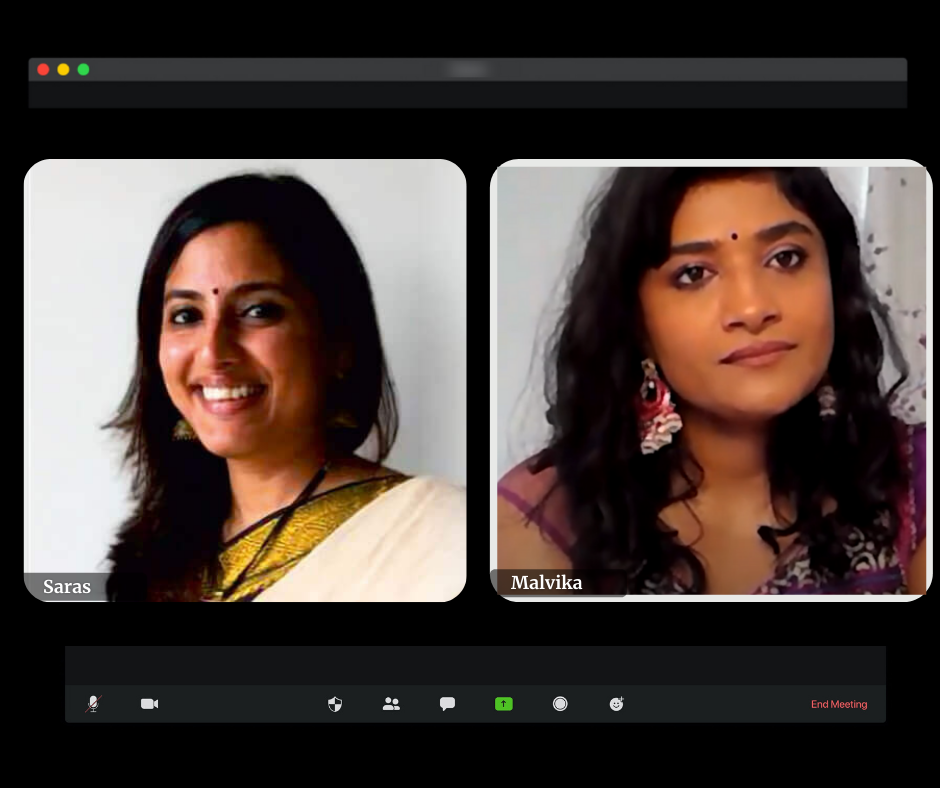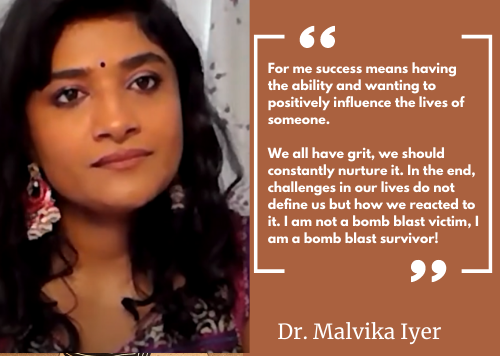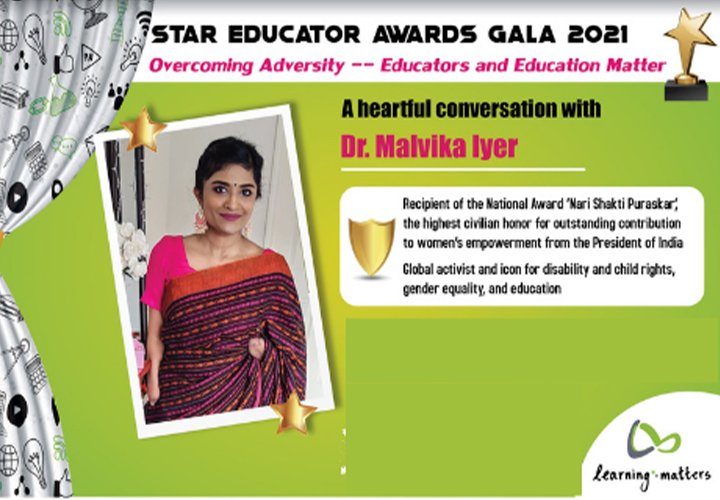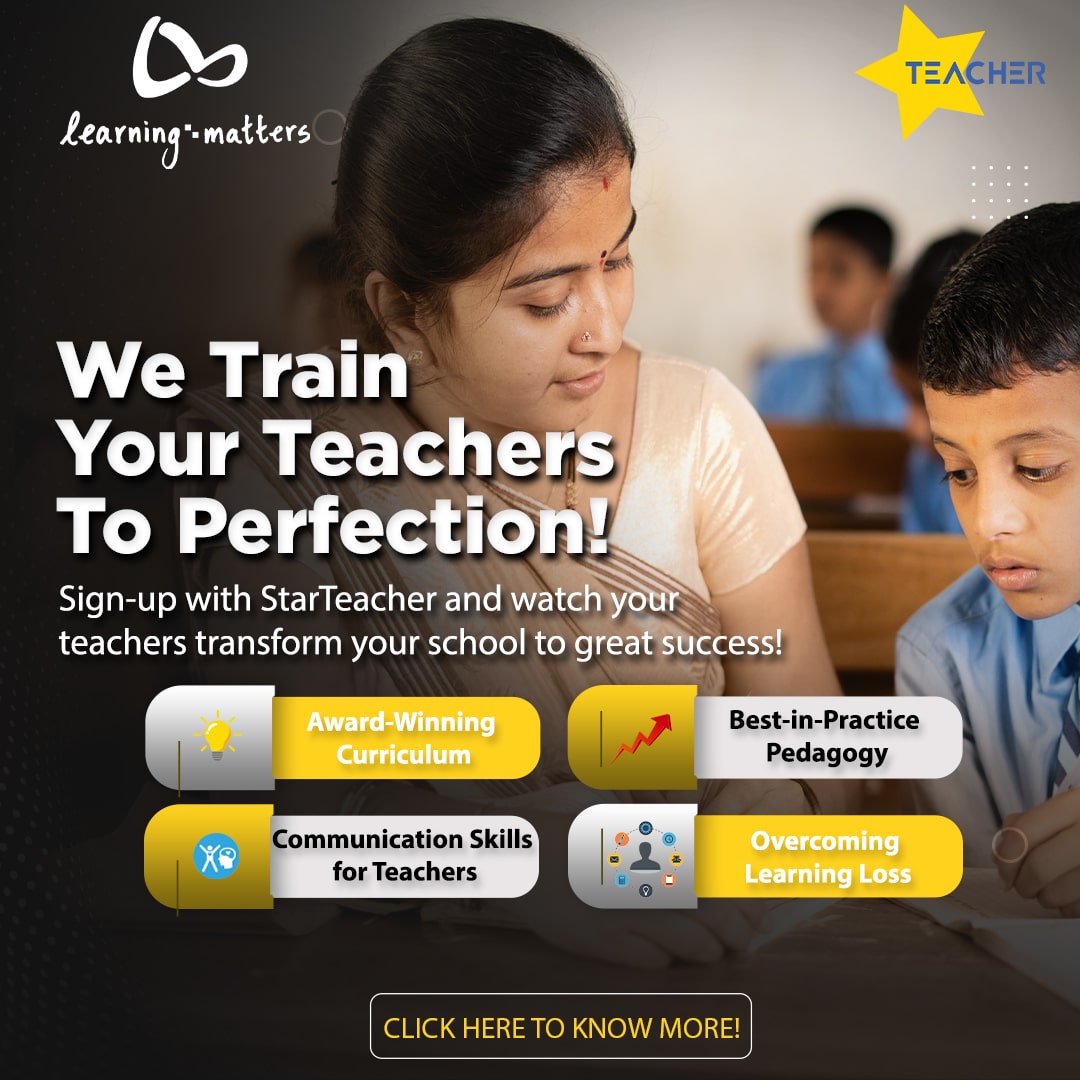The Star Educator Awards Gala was an evening filled with numerous luminaries from the education community. One among them was the chief guest for the evening, Dr. Malvika Iyer - a bomb-blast survivor, winner of India’s Nari Shakti Puraskar award, international motivational speaker and global icon for disability and child rights.
Dr. Iyer and our co-founder Saraswathy Ramamoorthy had a heartfelt conversation about education, educators, adversities and more. Here are excerpts from their inspiration-soaked conversation.
Keep reading to know more.

Saras: We are thrilled to have you here with us today and as our main theme is, ‘overcoming adversities’, there’s no one better than you to talk about it!
Malvika: This is a unique event. In general, a lot of my events are focused on motivational speaking. I am happy to be part of a particular event dedicated to teachers. Teachers are the first set of people who we meet after our parents, who have the power to change our mindset. It’s very important to celebrate teachers. I have many mentors, who have helped me realize my potential. They supported me knowing my capacity. Teachers do a great job and I am happy to be part of this celebration.
Saras: You have rightly pointed out the critical factor that teachers do shape the future of the world! As you know this event’s theme, ‘Overcoming Adversities’ has been a general theme of our lives for the past two years due to the pandemic. You are a living example of overcoming challenges! What are the top 3 elements that can help anyone reconcile and deal with adversities?
Malvika: The first and foremost one, which I strongly believe in is ‘attitude’. There is no way anyone can control lives by pressing the reset or rewind button. However, what we do have control over is our attitude or mindset. Thus, when we are facing adversities, it’s crucial to have the right attitude. It doesn’t have to be a sugar-coated positive attitude. My mother always told me, what matters the most when we are faced with adversities are how we face it or respond to it.
Furthermore, there is always a battle between success and failure. When we start a project or anything new. We generally assure that there are only two outcomes. Either, we succeed or fail. I don’t think that’s true. The opposite of success is failure and many think if they are losing, they are a failure. That’s not true at all. From my personal experience I can tell you that; when you give up in the face of adversity or refuse to come out of your comfort zone and try it is when you lose. That is the real failure. So, the opposite of success is when someone refuses to try. So, the ‘never give up’ attitude is the second quality one needs to overcome adversities. Even if you are losing and you keep trying again and again; you are still learning! In my case, doctors had completely given up on my legs. I am here today because I was determined to not give up.
Thirdly, ‘humour’ is a great weapon to face adversity. My mother is my biggest source of inspiration. I would often say to her, when things were not in my control, that, “Amma, idhu kai vittu poyidathu” (in Tamil) Mother, this has gone out of my hands! and she would say, “Unnaku dhaan kai ye illai, approm enna?!” (You don’t have hands, how can something be out of your hands then?) She would make such witty remarks, the word ‘hand’ has become a joke in our household. Honestly, this makes things easier. I have many examples of how such humour has helped us.
I think, attitude, not giving up , and humour are the 3 crucial things that can help one to face any adversities that come in their lives.
.png)
Saras: That’s a wonderful observation Dr. Iyer! Moving on to our next question; you have openly credited your education for playing a huge role in who you are today. So, what is the tangible impact that education has had on you?
Malvika: When the accident happened, I was 13 years old. I had just entered my 9th grade. I had lost my hands but the severity of injuries didn’t stop there. My legs were completely crushed. I had multiple fractures, nerve paralysis, and loss of sensation. It was a gory mess. I was bedridden for 18 months. So, I had to miss all of my 9th grade classes.
The accident happened in Rajasthan and later, I moved to Chennai for my further treatments as my grandparents also lived there. When I was talking to my friends from back home, I got to know that everyone is rigorously preparing for their 10th grade exams. We all know what a big deal the 10th standard exams are in India for a child. For me, the thought of lagging behind my peers and not being able to attend the exam was overwhelming. That’s when this wonderful coaching centre in Chennai, which was just two streets from my home in Chennai helped me. That’s where my real journey towards education began. I suggested to my mother that I write the board exams privately and I also had a cousin, who appeared privately for the exam. There’s a system that, if you clear 8th then you can directly write 10th exam. I suggested to my mom we take advantage of that as I didn’t want to waste one academic year.
So, that decision combined with the support of my family and the coaching centre helped me immensely. When we reached out to the coaching centre, this wonderful teacher said, “We will help you but it’s not possible to home tutor you. So, you have to come to the coaching class”. At that time, it seemed inconvenient. But, it really helped me. As I was sitting with my peers and learning, it helped me to come out of my comfort zone as I was facing the world with a different body. I managed to finish my 10th grade with all the support I got and secured a state rank with 97%. All my life, I was a person who would score 75-80%. During the 10th exams, all I did was study. When I scored such a mark in 10th and all the overwhelming responses I received made me realize, I had not lost everything.
I was a classical dancer and had keen interest in craft making and having lost the ability to do all that I love, education became my source of strength. Later, I joined a regular school and dreamed of pursuing higher studies in the future. I went on to do a double masters and my PhD. All of this gave me a lot of confidence and passing 10th in flying colours was the first step.
Being disabled myself, I decided not just to overcome my challenges but to be an advocate for the disabled. My research (M.Phil) which was also based on disabled people helped me to do the work I am doing today.
All of this wouldn’t have happened without the platform I got and the educational opportunities.
Saras: I love that, how you are equating education with confidence. That is absolutely right! Education bestows confidence and it translates to the generations in the family. Once we have a single person in the family, who has made it then the life trajectory for not just that person but the entire family and generation truly changes. When we speak of education, how can we not speak of educators? Could you share with us the important role played by educators in your life?
Malvika: The coaching institute I mentioned earlier had this teacher, Arul sir. Him giving me the platform and not saying ‘no’, you haven’t even done 9th grade yet was life changing for me. Imagine him rejecting me or saying something that would discourage me. That would have changed a lot of things. I think it started from him, from giving me the right platform and providing resources for me to continue my education.
The second wonderful experience was during 11th and 12th. That was my first time after the accident of being a part of inclusive education. I was the only person in my school (Anna Adarsh Chennai) with a disability. I was never treated differently by my teachers. In fact, they realized my potential and provided wonderful support. That really mattered to me. It could be a small thing for them but for me not being discriminated instilled a lot of confidence in me. I still remember my Economics teacher in 12th, who encouraged me to pursue the subject in my higher studies as well.
We meet so many wonderful teachers in every step of our lives, they truly shape us.
Thirdly, my thesis supervisor in M.Phil and PhD from Madras School of Social Studies. I am very fond of my PhD supervisor. He completely understood what my strengths are, like my communication skill and he ensured I utilized it to the optimum by making me attend events where I could speak. It’s amazing when teachers take personal interest in you. I am very blessed to have had these wonderful teachers from my school till doctorate. I am really glad that I got such support from them and I will forever be thankful for them.
Saras: It’s true that teachers can shape the future of children. We at Learning Matters passionately believe that and we strive to provide them with the right resources as most of them in this profession truly want to bring a change. However, many times even when they want to do better, they don’t know how. A single teacher can change the lives of thousands of students. What do you think of the impact of educators on society as a whole?
Malvika: I gained my confidence due to my mentors. For every individual, if they get such support, that would make a huge difference. When my accident happened, I had to overcome various adversities. During that time, the support from teachers played a critical role and because of that, I was able to pursue my education without any hindrance.
I have seen and personally known many educators doing an amazing job of shaping an individual. Today, me being an advocate of disabled people and having achieved all the things I did, I have many people to thank for. All the people who have been impacted by great teachers together can make a great community. Many of my teachers have connected with me on Facebook and they tell me how proud they are of me. It makes me believe they are also part of my journey. In fact, everyone is part of my story. If I am doing something, everyone’s effort matters. So, you are literally changing society by shaping an individual.
Saras: You truly are a global citizen. You have traveled all over the world. There’s no part of the world that you haven’t motivated or inspired. You are able to change the world’s perspective with your words on gender, importance of education and many other critical issues. I personally believe that, each time you or people like you choose to speak out or put yourself out there, the world changes for the better, every single time. Even if we are to impact two people and change their way of thought, that would be a tremendous impact that we have created. What is the role that your communication skills play in this?
Malvika: It is very important. Communication skills is a broad term. I think for me the ability to listen to people is a crucial bit of communication skill and it isn’t always about speaking. We need to listen to what is being said. So, we can help someone. And beyond that there is empathy and showing respect to the person who is talking to us, and giving weightage to what they are saying. I think all these will come under the broad topic of communication skills.
All of these skills I have learnt as part of my communication skills have greatly helped me.
Especially in the online world, it’s so easy to post a comment and just say what you are thinking. Many of us aren’t even completely reading what the other person has written and immediately wants to respond back. Many times we see comments that are so insensitive. This is where the communication skills matter the most! That’s what we have learnt in schools and colleges, to be an active listener and show empathy.
I once had an opportunity from the UN to share my story. It was very important for me to have these communication skills to engage with such a wide range of audience.
Communication skills certainly play a huge role in our lives. Once you know what you are saying and are confident and have the empathy to understand and listen to someone while responding appropriately and not just making up words because you need to make a point, that makes a huge difference in your communication.
Saras: That’s absolutely right! Speaking of listening; teachers are the ones who are often not heard. We listen to what parents have to say but teachers are often forgotten. We at Learning Matters are proud to say that, we spend a lot of time listening to what teachers have to say and try to provide the right support. I love that you focused on the listening part and you are very right!
A slight spin off in the communication topic here, what would you say are the advantages of speaking in the English language? Do you think you would be able to make as much of an impact without these skills? Specifically, do you think yourself would have this much of a global impact on people without English?
Malvika: Firstly, in terms of supporting this statement; I studied in English medium throughout my school and I may not have realised the value of the language until I started traveling around the world and communicating with people who are not Indians.
English certainly is useful. I have spoken in English in various countries where it isn’t widely used like Norway. When I spoke in English in Norway, I am sure there were many people who wouldn’t speak fluent English but everyone was able to communicate with me as everyone knew a little bit of English as it’s a global language. The English language really helped me when I was traveling around the world.
Saras: I absolutely agree with what you said. I think the problem happens when it’s considered as black or white and the attitude of people to sort of look down upon people who can’t speak English. English is a successful way to communicate or work with people. If we are able to upskill or train people to speak in English, it would be great.
Now moving on from English to perception of how people look at educators..So, this event and what we do at Learning Matters is all to honour and recognize, celebrate and honour teachers. While many acknowledge this, there aren’t many who choose to work for educators because it isn’t that glamorous.
Do you have any thoughts on this mindset or attitude? People do agree that educators are important but we don’t seem to be doing enough to actually enable them. There’s always this gap.
Malvika: My personal feeling is that organizations like you are certainly bringing a change by providing the right resources to teachers.
Teachers do shape a child’s future. I was working on my doctorate thesis, which was about the attitude of young people towards people with disabilities. I studied around a thousand subjects and I wanted to understand how their attitude changes or why they have a discriminatory attitude. Many times such studies show that these attitudes are formed at a young age. At such an age, other than parents, kids spend their time mostly with teachers. Thus, teachers truly can mould a person to become better. It’s important for these kids to have the right attitude as they are going to be the future policy makers and are going to be the future of the country. When we see today’s leaders talking about women's safety, people with disabilities and other critical issues in a questionable way, it must have been due to what they learnt during childhood.
So, who shapes these attitudes? It’s the teachers. It’s mainly what we study, academics and experiences. I had such amazing role models growing up and they certainly influenced me to become a better person.
Teaching isn’t easy at all. Even now with a doctorate I am scared to get into this profession. It’s a profession where we have to constantly upgrade and definitely not a stagnant profession. Now, with online teaching it has become more challenging due to technical adoption and there’s also many other subjects which are being discussed like students’ mental health and more. Teachers play various roles, they are like the gods of Indian mythology with many hands. They have to be experts on so many things. So, it’s only fair to note that they have to be completely compensated for that and give them what they deserve with all the support they need.
Saras: You hit the right nail when you said, ‘teaching is not a stagnant profession’. Many think like that but teachers in reality have to constantly upgrade. Unless we provide a platform to enable and empower them, how are they going out to bring out the best?
Moving back to our topic of ‘overcoming adversity’, what are the qualities needed to be successful and to be resilient in the face of challenges? Grit is one of the most important things needed for that and no one knows grit better than you. What would you like to tell us about how we can cultivate grit among each one of us?
Malvika: I don’t know about others but for me success means having the ability and wanting to positively influence the lives of someone.
When I share my story, I like people to see things that many don’t post on social media like behind the scenes and all the hard work. We live in a world where everything is nice on social media, people achieving things, living life king size. It’s important to understand that everyone has a different timeline. I have also been a victim of that. I have seen people doing so much better than me. I wish for myself that I should be like that too. But each of us have a different story. After my accident, I had to relearn everything from holding a spoon to walking to writing.
We humans are made of such strong spirits, we have perseverance. No challenges can take that away from us. We owe it to ourselves to nurture that spirit. Many times, I say my accident took a lot from me but one thing it didn’t take away is my spirit. I think to cultivate spirit is where we need grit.
Grit isn’t just about becoming successful or overcoming an obstacle. It’s a lifelong process like learning. It took me many years to accept my new body or even take pictures of myself or show myself. I wore prosthetic hands to avoid people’s stare. Things take time, it’s a process.
We all have grit, we should constantly nurture it. In the end, challenges in our lives do not define us but how we reacted to it. I am not a bomb blast victim, I am a bomb blast survivor!

Saras: That’s beautifully said, Dr. Iyer! So, what would you say is your favourite quote on, ‘attitude towards adversity’?
Malvika: “The only disability in life is a bad attitude” – Scott Hamilton
I am a person with a disability and I understand I have certain limitations but at the same time I have received a lot of support. May it be financial support from parents, educational opportunities and more. What if I sat down and sulked that, I don’t have hands and what is the point of doing anything? Such a negative attitude like pitying myself or thinking of myself as less of a person even with the right resources and support would have hindered my growth. So, I always emphasize on attitude to be the biggest factor to overcome adversity. If you have the right attitude, the sky's the limit!
Saras: Thank you so much for reminding us that the biggest disability can be our mind sometimes and helping us look past that.
The Star Educator Awards Gala was an evening filled with unadulterated inspiration. From our key speaker Dr. Iyer to our honourable winners, everyone shared their mantras for accepting change, overcoming challenges and emerging victorious.
Do check out the SEA gala 2021 for motivation to keep going... no matter what.


Comments